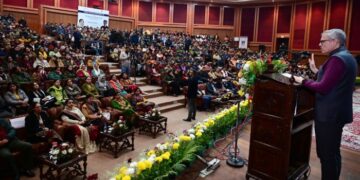Srinagar: In a petition agitating unjustifiable withholding of payment by Public Works Department’s (PWD) R&B wing for a work executed in 2017, the High Court on Friday directed the UT chief secretary to formulate and implement a Standard Operating Procedure (SOP) to ensure that dues for completed contractual works are paid within sixty days.
While passing the direction in the writ petition filed by M/s Saint Soldier Engineer and Contractor of Jammu, Justice Wasim Sadiq Nargal directed the government to pay the contracting company the remaining liability approximating Rs 98 lakhs with six percent interest since 2017, within four weeks.
The bench directed the Chief Secretary of the UT “to formulate and implement an SOP to ensure that no admitted dues arising from completed contractual works are withheld beyond a period of sixty days from the date of submission of final bills, provided there is no legal impediment and all the codal formalities are completed.”
It also held that while formulating and implementing the SOP and with a view to uphold the principle of fairness and accountability, a compliance affidavit to this effect shall be filed within six weeks.
Interestingly, many notices were sent by the court to the respondent Commissioner Secretary PWD, engineers and others in the department. But they chose not to respond and file any objections in the case.
The court even gave an opportunity to Ravinder Gupta, the senior additional advocate general of the government, to argue the matter in absence of counter-affidavits.
On this power-play by the “inflated egotistic bureaucracy”, the court remarked “such conduct would constitute an arbitrary exercise of power, contrary to the principles enshrined under Articles 14 of the Constitution of India….”
The State, as a party to contractual engagements, is duty-bound to uphold the principles of fairness, transparency, and good governance, and to discharge its financial obligations promptly and without undue delay, it said.
The court held “once the work has been executed strictly in accordance with the terms and conditions set out in the tender and the agreement, the respondents shall be under a clear statutory and contractual obligation to release the due payment without any undue or arbitrary delay”.
It said that after the execution of work, the respondents shall not be permitted to raise objections pertaining to administrative approvals, sanction of funds, or diversion of funds as grounds to withhold or delay payment.
In cases, where the delay in payment is not attributable to the contractors, the respondents shall be liable to pay interest on the outstanding amount at the prevailing rates in nationalized banks, calculated from the date the payment fell due until the actual date of payment, directed the court.
Where delay or withholding of payment arises from negligence, omission, or mala fide conduct on the part of any officer or official, “the accrued interest shall be recovered from the salary or emoluments of such officer, thereby fixing personal accountability and deterring arbitrary exercise of power”, directed the court.
It observed “welfare State cannot legitimately plead paucity of funds when payments for works already executed and utilized are withheld. The principle of economic justice obliges the State to ensure that contractors, having fulfilled their part of the bargain, are not subjected to financial distress on account of arbitrary or habitual withholding of dues”.
In cases of habitual or willful withholding, apart from interest, the court warned that it may impose exemplary costs against the erring department.
The court remarked that let it be underscored that constitutional governance does not permit the State to hide behind bureaucratic excuses while depriving its contractors of their rightful dues. “The dignity of governance lies not merely in rule-making, but in timely honouring of obligations, duty which the State, as a model litigant, is expected to uphold scrupulously”, it said.








